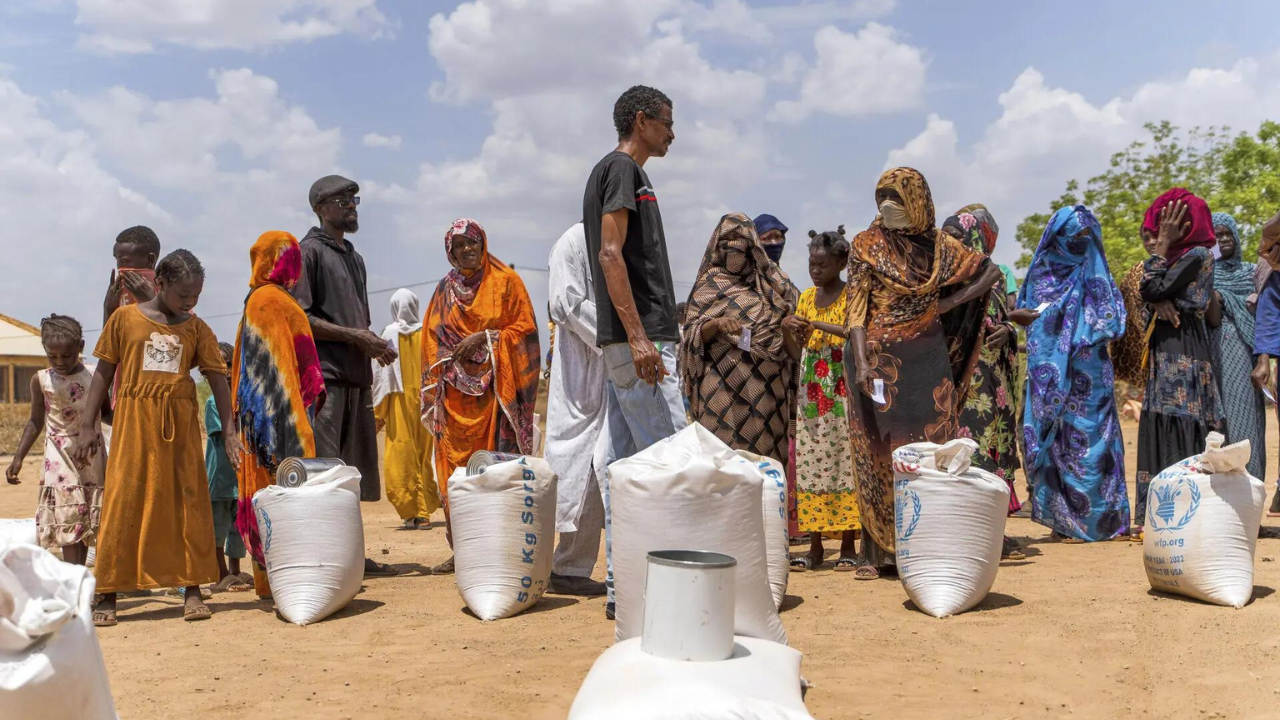Sudanese fleeing war are at risk of worsening hunger in neighbouring nations, UN warns

CAIRO: Millions of people fleeing the conflict in Sudan risk falling deeper into hunger as they seek refuge in countries already grappling with food insecurity, the United Nations warned.
The World Food Programme, the UN's food agency, said Monday that over four million Sudanese refugees in neighbouring countries are at risk of suffering further food insecurities as crucial funding for life-saving food assistance is expected to dwindle in the coming months in the Central African Republic, Egypt, Ethiopia, Libya, Uganda and Chad.
About 40,000 people have been killed and nearly 13 million displaced, including to other countries, by Sudan's civil war that began in April 2023, according to estimates from UN agencies.
Nearly half of the population remaining in Sudan is facing acute food insecurity, with some areas of the country suffering from malnutrition, which has killed 239 children in the past six months in El Fasher, the capital of North Darfur province, the Sudan Doctors Network said.
The group said the children died as a result of severe shortages of food and medicine, and the bombing of nutrition warehouses in the Sudanese province between January and June.
Sudan plunged into war in April 2023 when simmering tensions between the Sudanese army and its paramilitary rival, the Rapid Support Forces, escalated to fighting in the capital of Khartoum and spread across the country.
But those fleeing the conflict continue to suffer from malnutrition even beyond Sudan's borders.
"Refugees from Sudan are fleeing for their lives and yet are being met with more hunger, despair, and limited resources on the other side of the border," said Shaun Hughes, WFP's emergency coordinator for the Sudan Regional Crisis. "Food assistance is a lifeline for vulnerable refugee families with nowhere else to turn."
Food insecurity and famine conditions have spread across Sudan. The Darfur Victims Support Organisation on Tuesday posted pictures on Facebook showing scores of citizens lining up to receive a meal from a charity kitchen.
The group appealed to international organisations to take notice of the humanitarian situation in the city and called on armed groups to declare a truce and open corridors to deliver much-needed civilian aid.
The southern part of El Fasher saw renewed clashes between the army and the RSF Monday morning despite the UN calling for a week-long ceasefire in the city for aid distribution, which the Sudanese army accepted, the Darfur-based group said.
The El Fasher Resistance Committee said Sunday that heavy artillery shelling targeted several residential areas and the livestock market for the third day in a row, killing and injuring civilians amid a deteriorating humanitarian situation in the area.
The Trump administration's cuts to the US Agency for International Development have also had an impact, with programmes being defunded. In Sudan, 90 communal kitchens closed in Khartoum, leaving more than half a million people without consistent access to food, according to the International Rescue Committee, a humanitarian aid organisation.
The World Food Programme, the UN's food agency, said Monday that over four million Sudanese refugees in neighbouring countries are at risk of suffering further food insecurities as crucial funding for life-saving food assistance is expected to dwindle in the coming months in the Central African Republic, Egypt, Ethiopia, Libya, Uganda and Chad.
About 40,000 people have been killed and nearly 13 million displaced, including to other countries, by Sudan's civil war that began in April 2023, according to estimates from UN agencies.
Nearly half of the population remaining in Sudan is facing acute food insecurity, with some areas of the country suffering from malnutrition, which has killed 239 children in the past six months in El Fasher, the capital of North Darfur province, the Sudan Doctors Network said.
The group said the children died as a result of severe shortages of food and medicine, and the bombing of nutrition warehouses in the Sudanese province between January and June.
Sudan plunged into war in April 2023 when simmering tensions between the Sudanese army and its paramilitary rival, the Rapid Support Forces, escalated to fighting in the capital of Khartoum and spread across the country.
But those fleeing the conflict continue to suffer from malnutrition even beyond Sudan's borders.
"Refugees from Sudan are fleeing for their lives and yet are being met with more hunger, despair, and limited resources on the other side of the border," said Shaun Hughes, WFP's emergency coordinator for the Sudan Regional Crisis. "Food assistance is a lifeline for vulnerable refugee families with nowhere else to turn."
Food insecurity and famine conditions have spread across Sudan. The Darfur Victims Support Organisation on Tuesday posted pictures on Facebook showing scores of citizens lining up to receive a meal from a charity kitchen.
The group appealed to international organisations to take notice of the humanitarian situation in the city and called on armed groups to declare a truce and open corridors to deliver much-needed civilian aid.
The southern part of El Fasher saw renewed clashes between the army and the RSF Monday morning despite the UN calling for a week-long ceasefire in the city for aid distribution, which the Sudanese army accepted, the Darfur-based group said.
The El Fasher Resistance Committee said Sunday that heavy artillery shelling targeted several residential areas and the livestock market for the third day in a row, killing and injuring civilians amid a deteriorating humanitarian situation in the area.
The Trump administration's cuts to the US Agency for International Development have also had an impact, with programmes being defunded. In Sudan, 90 communal kitchens closed in Khartoum, leaving more than half a million people without consistent access to food, according to the International Rescue Committee, a humanitarian aid organisation.
Next Story